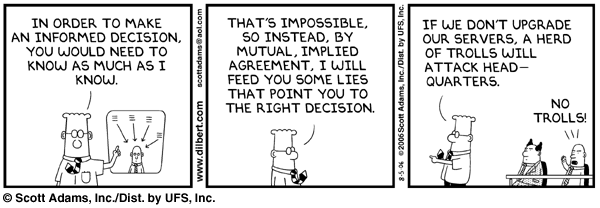1) A quote from Charles Munger:
I have said that in my whole life, I've known no wise person over a broad subject matter area who didn't read all the time--none, zero. Now I know all kinds of shrewd people who by staying within a narrow area can do very well without reading. But investment is a broad area. So if you think you're going to be good at it and not read all the time, you have a different idea than I do.... You'd be amazed at how much Warren [Buffet] reads. You'd be amazed at how much I read.I agree with QuantLogic: I can't think of a single person whose [broad] analytical expertise I admire, who doesn't read constantly. (Note, this doesn't include some special cases of narrow expertise, such as in math or science, which may border on idiot savant capability ;-)
Actually, all other forms of communication suffer from much lower baud rates. Think how little information you get per unit time from even the best broadcast news sources or interviews, relative to reading. Focused discussion with a real expert is the only activity which I find as efficient -- which is one of the reasons I'm still willing to travel to conferences, give seminars at other institutions, and schlep down to the valley :-)
2) The following cartoon, which shows unparalleled insight into organizational behavior :-)


6 comments:
Excellent.
Oh, that was me, hello Steve. I have trouble easily reading the darned codes for comments, however, but read all the time we must.
Anne
"Actually, all other forms of communication suffer from much lower baud rates. Think how little information you get per unit time from even the best broadcast news sources or interviews, relative to reading"
Tell me about it. This Thanksgiving I made the mistake of watching the CBS Evening News. "Sales may have been up as much as 17%" May have? That's news? (And of course, today Walmart paints a very different picture.)
I should note that in "deep" areas like math or physics a lot of thinking and internal reflection are required. The density of information conveyed by technical books or research articles (as opposed to simple information in non-technical subjects) is so high that each hour of reading might be accompanied by many hours of subsequent processing before the content is understood.
So, once I understoood a bit about economics, history, etc. I found myself reading voraciously to add to my understanding. That isn't how it went with math and physics, though. Proportionally, I spent more time with a pencil and a piece of paper, scribbling.
This goes back to the observation that deep subjects compress huge amounts of information into a few equations or concepts (e.g., "entropy","general covariance"), and the unpacking of that information is the hard or time consuming part.
Hi Steve,
I just checked my blog's log and noticed the huge spike in traffic, which was unexpected since I haven't written anything is a couple months.
That Dilbert is one of my all-time favorite Dilbert's; I'm glad you (and apparently a lot of you readers) liked it. I quite enjoy your blog also.
Marc,
Thanks for your comment. Now get back to blogging! Several months hiatus is too long :-)
Steve
Post a Comment